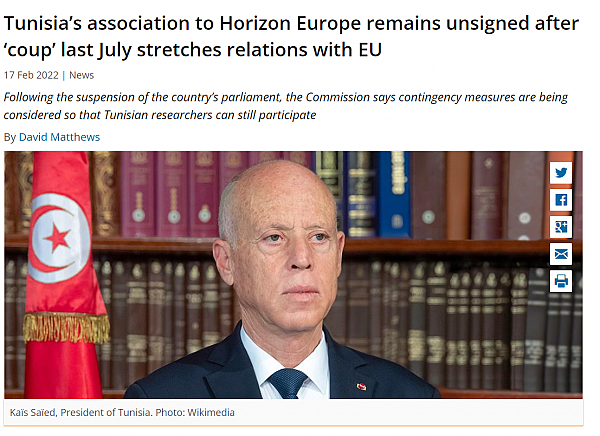Press Tunisia’s association to Horizon Europe remains unsigned after ‘coup’ last July stretches relations with EU
The European Commission may step in with bridging funding for Tunisian scientists after the country’s president shut down parliament, potentially derailing the ratification of Tunisia’s Horizon Europe association.
The political crisis, described by some as a coup, poses a dilemma for Brussels over whether to allow Tunisia to participate in its research and innovation programme, with MEPs divided over whether to use Horizon Europe as a lever to nudge it back towards democracy.
Last July, amid spiking COVID-19 cases and protests against economic difficulties, president Kais Saied dismissed the government and suspended parliament. Saied later started to rule by decree.
Although he does have some popular support, but in October 2021 Saied’s power grab was condemned by the European Parliament, which said it, “raises concerns about Tunisia’s democratic transition” in a country once seen as a beacon of democracy in north Africa.
Earlier this month, Saied dissolved the country’s Supreme Judicial Council, accusing it of corruption.
Neither Tunisia nor the EU have explicitly admitted that the crisis is holding up association.
But Tunisia is now the only country apart from the Faroe Islands and the UK to have agreed a Horizon deal in principle but not signed it off, with UK association being held up by wider disputes over the post-Brexit settlement.
“There is sufficient reason to believe that the signing of the association agreement of Tunisia to the Horizon Europe programme is currently delayed due to the political crisis in Tunisia,” said Salima Yenbou, a French Green MEP who next week will travel to the country as part of the parliament’s committee on foreign affairs.
Earlier this month Albania became the latest longstanding partner to ratify association, joining Israel, Turkey, Norway, Iceland, and countries in the Western Balkans. Like these countries, Tunisia was also a member of Horizon 2020, the only African country to associate.
The Commission insists that its decision required for signature “will be soon adopted” and that the EU and Tunisia should sign on the dotted line “in the near future”.
But contingency measures to allow Tunisian researchers to participate in Horizon Europe for the first half of the year are “under discussion” because “the Tunisian national legislation requires as well a ratification of the association agreement for its entry into force,” a Commission spokeswoman said.
Contingency measures “would enable funding of Tunisian researchers in Horizon Europe actions thus facilitate their participation in Horizon Europe pending the entry into force of the association agreement,” said the spokeswoman.
Damage to scientific links
Tunisia’s parliament remains suspended, and Saied has said it will remain so until fresh elections in December 2022. Before that, a referendum on a revised constitution is due to be held in July.
The Commission now has to choose whether to allow Tunisia to participate, and risk appearing to condone Saied’s actions, or cut off access to Horizon Europe, damaging scientific links and Tunisian academics.
“My view is that the European Commission should wait until the political situation in this country is clarified before making a final decision,” said MEP Maria da Graça Carvalho.
Under current rules, third countries are only allowed to join if they engage in “respect of human rights, backed by democratic institutions”, meaning that it is “impossible to fully implement this agreement,” she said.
“However, we need to remember that one of the goals of cooperation is precisely to contribute to strengthening the democratic values across the world, so this door should remain open,” said Carvalho.
Yenbou sees things differently. “Not signing the association agreement would mean that Tunisian researchers who have already organised themselves in international consortia for the next project cycle would be barred from participating,” she said.
If the EU wants to apply pressure on Saied, it should instead use its financial aid as a lever, not Horizon Europe, Yenbou said. “The European Commission tells us that they are closely coordinating with the European External Action Service to secure the signature in March this year,” she noted.
Complicating matters for the EU is the fact that member states do not have a strong common line on Saied’s power grab. Last October, EU high representative Josep Borrell demanded a return to “parliamentary democracy and protection of fundamental freedoms” after a call with the president. Germany has also issued strong statements of concern.
But last year Greece issued a much warmer message to Saied, stressing the friendship between the two countries and delivering 100,000 doses of COVID-19 vaccine.
Tunisia is ready to sign the association agreement, according to the Ministry of Higher Education and Scientific Research. “During all the negotiation stages, Tunisia responded without delay to any request from the European Commission,” a ministry spokesperson said.
Currently, Tunisian researchers are still able to apply for Horizon Europe calls. Researchers in countries that are in the process of associating are treated as though already associated, a Commission spokeswoman confirmed.
In Horizon 2020, Tunisia won €13.1 million in funding, around 0.2% of the money that went to associated countries.

